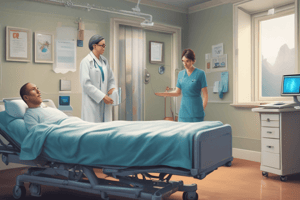Podcast
Questions and Answers
In what capacity is nursing considered an 'art'?
In what capacity is nursing considered an 'art'?
- It involves the application of the scientific method.
- It requires a standardized approach to patient care.
- It focuses primarily on technological interventions.
- It relies on creativity, compassion, and communication to care for individuals. (correct)
Which statement best describes the 'science' aspect of nursing?
Which statement best describes the 'science' aspect of nursing?
- The exclusive use of natural remedies.
- An avoidance of technology in treatment methodologies.
- A body of knowledge based on carefully collected and classified facts. (correct)
- A reliance on tradition and intuition in patient care.
How does the 'art' of nursing contribute to a patient's well-being?
How does the 'art' of nursing contribute to a patient's well-being?
- By isolating patients to minimize external influences.
- By implementing strict protocols regardless of patient preference.
- By fostering a compassionate and communicative environment. (correct)
- By relying solely on the latest technological advancements.
What is the primary distinction between the educational paths of an Enrolled Nurse (EN) and a Registered Nurse (RN)?
What is the primary distinction between the educational paths of an Enrolled Nurse (EN) and a Registered Nurse (RN)?
In terms of scope of practice, what is a key difference between an Enrolled Nurse (EN) and a Registered Nurse (RN)?
In terms of scope of practice, what is a key difference between an Enrolled Nurse (EN) and a Registered Nurse (RN)?
How do the leadership and management responsibilities typically differ between Enrolled Nurses (ENs) and Registered Nurses (RNs)?
How do the leadership and management responsibilities typically differ between Enrolled Nurses (ENs) and Registered Nurses (RNs)?
What is the ethical principle of 'Autonomy' in health care primarily concerned with?
What is the ethical principle of 'Autonomy' in health care primarily concerned with?
In healthcare ethics, what does 'Beneficence' refer to?
In healthcare ethics, what does 'Beneficence' refer to?
What is the primary goal of 'Non-maleficence' in patient care?
What is the primary goal of 'Non-maleficence' in patient care?
When considering the ethical principle of 'Justice' in healthcare, what is the main concern?
When considering the ethical principle of 'Justice' in healthcare, what is the main concern?
What does the ethical principle of 'Veracity' primarily require of healthcare professionals?
What does the ethical principle of 'Veracity' primarily require of healthcare professionals?
In the context of healthcare ethics, what is the meaning of 'Fidelity'?
In the context of healthcare ethics, what is the meaning of 'Fidelity'?
Why are 'legal limits of nursing' established?
Why are 'legal limits of nursing' established?
How does 'scope of practice' define the legal limits of nursing?
How does 'scope of practice' define the legal limits of nursing?
What does it mean for a nurse to have a valid and current 'nursing license'?
What does it mean for a nurse to have a valid and current 'nursing license'?
Why is 'accurate and thorough documentation' important in nursing?
Why is 'accurate and thorough documentation' important in nursing?
What is the importance of 'confidentiality' in nursing patient care?
What is the importance of 'confidentiality' in nursing patient care?
Why is 'informed consent' important before performing any treatments or procedures?
Why is 'informed consent' important before performing any treatments or procedures?
When a nurse 'delegates' a task to another healthcare personnel, what must they ensure?
When a nurse 'delegates' a task to another healthcare personnel, what must they ensure?
Which scenario represents a violation of patient confidentiality?
Which scenario represents a violation of patient confidentiality?
Flashcards
What is nursing?
What is nursing?
An accountable discipline guided by science, ethics, care, and comfort in response to health and illness.
Science in nursing
Science in nursing
A body of knowledge with facts arranged to establish laws and principles.
Art in nursing
Art in nursing
A skill acquired by study and practice, showing compassion and care.
Enrolled Nurse (EN)
Enrolled Nurse (EN)
Signup and view all the flashcards
Registered Nurse (RN)
Registered Nurse (RN)
Signup and view all the flashcards
EN Scope of Practice
EN Scope of Practice
Signup and view all the flashcards
RN Scope of Practice
RN Scope of Practice
Signup and view all the flashcards
EN Clinical Responsibilities
EN Clinical Responsibilities
Signup and view all the flashcards
RN Clinical Responsibilities
RN Clinical Responsibilities
Signup and view all the flashcards
EN Leadership Role
EN Leadership Role
Signup and view all the flashcards
RN Leadership Role
RN Leadership Role
Signup and view all the flashcards
Autonomy
Autonomy
Signup and view all the flashcards
Justice
Justice
Signup and view all the flashcards
Beneficence
Beneficence
Signup and view all the flashcards
Veracity
Veracity
Signup and view all the flashcards
Non-maleficence
Non-maleficence
Signup and view all the flashcards
Fidelity
Fidelity
Signup and view all the flashcards
Scope of Practice
Scope of Practice
Signup and view all the flashcards
Licensure
Licensure
Signup and view all the flashcards
Documentation
Documentation
Signup and view all the flashcards
Study Notes
- Nursing is an accountable discipline guided by science, theory, a code of ethics, and the art of care and comfort in response to health and illness.
- Nursing is both an art and a science.
Nursing as an Art
- Defined as a skill acquired through study and practice.
- It involves practical knowledge on how to achieve specific results.
- It encompasses compassion, caring, and effective communication, as cited by Palos in 2014.
- It is about caring for both sick and well individuals, utilizing dynamic skills and methods to aid in recovery, health promotion, and maintenance.
- Involves creatively applying knowledge to serve others.
Nursing as a Science
- It is a structured body of knowledge based on carefully collected and classified facts to establish principles and laws.
- Requires a strong educational foundation and a deep understanding of human behavior.
- Is degree qualified
- Demands skill and knowledge
- Is professional
- Requires competency
Roles and Responsibilities of Enrolled Nurses (ENs) and Registered Nurses (RNs)
Education and Licensing
- ENs complete a 1-2 year diploma or certificate program and must pass a licensing exam.
- RNs require a bachelor’s degree in nursing, completed in 3-4 years, and must pass a national licensure exam.
Scope of Practice
- ENs provide basic care under the supervision of an RN, including monitoring vital signs and assisting with daily activities.
- RNs perform broader duties, which include conducting physical exams, developing care plans, and supervising ENs.
Clinical Responsibilities
- ENs handle routine care and less complex procedures.
- RNs perform complex tasks such as administering IV medications and conducting advanced assessments.
Leadership and Management
- ENs have limited leadership roles, potentially overseeing junior staff.
- RNs often take on leadership roles, such as charge nurse and unit manager, and are involved in policy and administration.
Health Ethics
- Autonomy: Respecting patients' rights to make their own health choices.
- Justice: Treating all individuals fairly and ensuring equitable access to healthcare.
- Beneficence: Doing good and acting in the best interest of patients.
- Veracity: Being honest and truthful with patients.
- Fidelity: Maintaining promises and loyalty to patients.
- Non-maleficence: Avoiding harm to patients.
Legal Limits of Nursing
- The legal limits of nursing are boundaries set by laws and regulations that dictate the scope of professional nursing practice, ensuring patient safety, maintaining professional standards, and protecting the public.
- Scope of Practice: Defined by state or national laws, outlining the duties and procedures nurses can legally perform based on their education and licensure.
- Licensure: Nurses must hold a valid and current license; practicing without one is against the law.
- Delegation: Nurses can delegate tasks to other healthcare personnel if the tasks are within the delegatee's scope of practice and competence.
- Documentation: Nurses must maintain accurate and thorough patient care records; incomplete or falsified documentation can lead to legal consequences.
- Confidentiality: Nurses must protect patient privacy and confidentiality under the law.
- Informed Consent: Nurses must ensure patients understand and agree to treatments/procedures. Performing procedures without informed consent can lead to legal action.
Studying That Suits You
Use AI to generate personalized quizzes and flashcards to suit your learning preferences.



